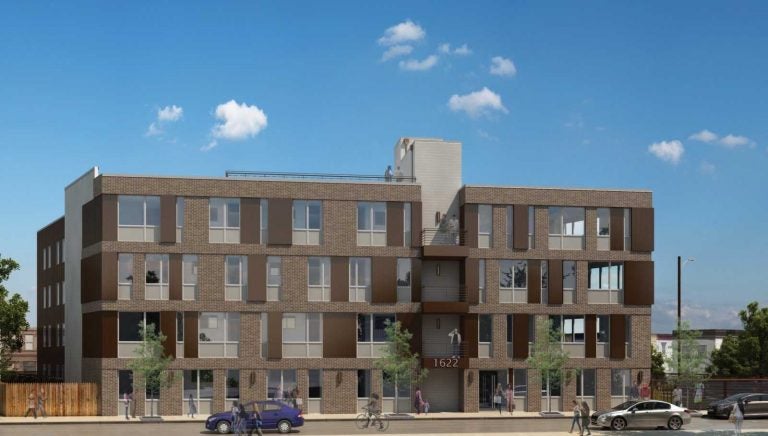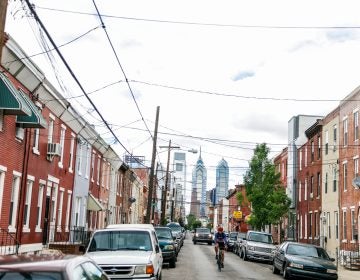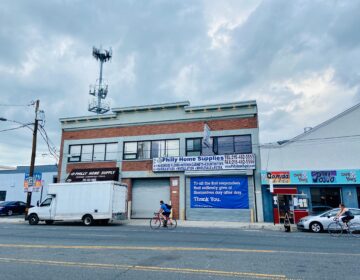Feibush to build apartments on Point Breeze Ave. lot where ill-fated beer garden once stood
John Longacre’s ill-fated 2015 beer garden attracted anti-gentrification protesters to the lot. Now Ori Feibush plans to build an apartment complex.

An artist's rendering of an apartment complex planned for Point Breeze Avenue. (Ori Feibush)
Vacant lots and shuttered businesses line Point Breeze Avenue despite a long-running surge in reinvestment on the surrounding blocks.
But Ori Feibush, one of the neighborhood’s most prominent developers, has big plans for the corridor.
This week, community members got a taste of what those proposals might look like when Feibush and his business partner Jim Robertson pulled building permits for a large new apartment building at the site of a controversial former beer garden.
“Both of us have a lot of other interests in the corridor and we are excited to bring some density, people, traffic, and customers to the rest of the Point Breeze Avenue,” Feibush said.
John Longacre’s ill-fated 2015 attempt to bring a beer garden to a vacant lot between Fernon and Morris streets was one of the most notable recent attempts to bring life to the decrepit commercial corridor. The effort attracted the ire of many surrounding residents and censure from the city’s Department of Licenses and Inspections. The parcel at 1622-40 Point Breeze Avenue has languished ever since.
Until now.
Feibush and Robertson, who is also employed at Feibush’s OCF Realty as a broker, are planning a four-story apartment building on the site. It will host 60 one-bedroom units, with no parking and no space for commercial uses.
Feibush says that south of Tasker he sees opportunities for higher density, purely residential buildings. Farther north on the avenue, the developer duo recently acquired sites, including a Family Dollar at 1325 Point Breeze Ave., where they hope to bring mixed-use development.
Those projects depend on zoning changes introduced by Councilmember Kenyatta Johnson last year. The legislation would have upzoned the neighborhood commercial corridor, but Johnson allowed the bill to expire after backlash from some neighborhood groups.
“Unfortunately, the zoning for those continues to run into the anachronistic zoning, so we are waiting with bated breath to see if the councilman reintroduces zoning reform,” said Feibush, who made a losing bid against Johnson in the 2015 Democratic primary. “That will determine whether those projects ever get off the ground.”
Johnson’s bill would have changed the avenue’s zoning to more than double the density of residential units allowed above the commercial spaces. Feibush says those rents are needed to make commercial spaces viable in a neighborhood where consumer dollars aren’t as abundant as they are on East Passyunk Avenue or South Street.
The three-term Councilperson said he is working with the community “to come up with a comprehensive revitalization plan for Point Breeze Avenue.”
“I have not made a decision concerning the rezoning of Point Breeze Avenue and the introduction of future legislation on the issue, ” Johnson said in an emailed statement.
But the project on the site of the former beer garden will not need legislative assistance to move forward.
The proposal at 1622-40 Point Breeze Avenue is making use of two zoning bonuses to win extra height and extra units for the project. A green roof will add seven feet of height, while additional density will be obtained by paying almost $400,000 into the city’s Housing Trust Fund.
Albert Littlepage of the Point Breeze Community Development Coalition said that he expects the project will stoke some controversy because of the small size of the units, which he likened to a college dormitory and the lack of parking.
“The kind of client they are going to be reaching out to seems like more of a college base,” said Littlepage. “If it’s like a college dormitory. I think some in the community would be opposed to that. If it was more family-oriented, I think the community would be more accepting.”
On Tuesday night, Feibush posted a rendering of the prospective building in a neighborhood Facebook group and asked for feedback on the design. Littlepage described the project as “oatmealish.” Numerous respondents requested something akin to what Noah Ostroff did at 13th and Reed, an apartment building on the other side of Broad Street that adopted the look of a 19th-century factory.
“We will improve the design, I promise, this was a first pass to get feedback,” said Feibush. “It seems like the prevailing theme is that residents want something more traditional.”
The units in the building will rent for between $1,250 and $1,350 a month and the total cost of construction is likely to be almost $6 million. Another multi-family proposal on neighboring lots fronting on Fernon Street is anticipated to break ground later this year and will cost another $5 million.
Editor’s Note: This article was updated at 11:43 a.m. with comments from Councilperson Kenyatta Johnson.
WHYY is your source for fact-based, in-depth journalism and information. As a nonprofit organization, we rely on financial support from readers like you. Please give today.







